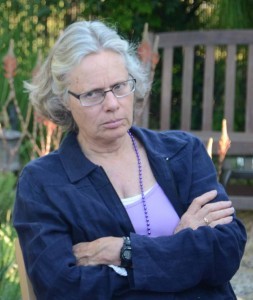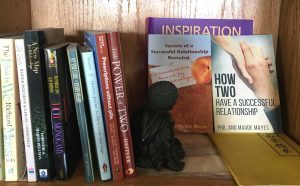Maude Mayes's Blog: Secrets of a Successful Relationship Revealed, page 94
November 16, 2016
Successful Relationships Reading Corner
In this week’s blog we wrote about the impact of the election–how to both stay present and move forward. These posts all have insights and advice on how to proceed after the election, as well.
The Critical Role of Self-Care for Handling Post-Election Stress “So what can you do if you’re feeling overwhelmed? Many of the practical steps you can take are common-sensical: exercise, see friends, be mindful, listen. And finally, when you’re ready, turn your feelings into action. ‘Try to place today in the timeline of your life,’ says Northeastern University psychologist Lisa Feldman Barrett, author of the forthcoming book How Emotions Are Made.”
5 ways to deal with post-election stress “Now that the presidential election is over, you may be feeling high levels of stress and anxiety…. Dr. Deb Sandella, author of “Goodbye Hurt & Pain,” promotes a body-centered, transformational technique that frees you of negative thoughts, according to her website.”
Beware the “All Trump Supporters Are Like That” Trap “This is a post about moving forward. And it includes an apology. This week’s election created a firestorm in this country that was like nothing I’d ever seen. Emotions connected with national politics are more charged and volatile than I can remember in my 46 years.”
November 13, 2016
How to Both Stay Present and Move Forward
 A student asked, “When times of great difficulty visit us, how should we meet them?”
A student asked, “When times of great difficulty visit us, how should we meet them?”
The teacher said, “Welcome.”
Last week we wrote about the importance of staying present during a crisis such as a flat tire. This week, the universe pushed the button labeled “Practice What You Preach” and produced the U.S. election results. It has been a challenging week that has brought strong divisions between people. In these times it is important to remember what brings us all together; to reflect on our shared humanity and our relationship to the earth and all the other beings we share it with.
We must treasure our relationships. We must hold close to one another and support each other in navigating through these challenges. Seek for unifying factors and ways to communicate with each other without increasing conflict. Take a breath. Practice gratefulness. Love is the great unifier.
Seek for unifying factors and ways to communicate with each other without increasing conflict #quote
Click To Tweet
In our previous blog, we discussed how staying with what is, instead of worrying about what will be, or trying to make what is into something else is the choice that supports peace and balance.
When we stay present, we are more apt to recognize that which is real from that which is not. We can be free from all our stray thoughts, worries and concerns. We experience what is actually happening and can be attending to what is happening with our full selves.
And in challenging times, we need everyone to be able to bring the full force of their presence to the situation. We need each other. We need to be able to function together if we are to have the ability to implement change and to bring peace into living presence.
Seek for mutual solutions. Look toward resolutions that take all parties needs into consideration. Listen to each other. Speak with each other. Be present with each other.
Conflict is NOT inevitable. There is another way.
Phil’s Meditation Practice
My meditations are like peeling an onion.. The outermost layer is thoughts, ideas, what happened yesterday, what my plans are, how I should tackle a problem, oops – I’m not watching my breath. Wash, rinse and repeat.
Once that layer is thinned out, I meet the layer of emotions that have been held at bay by those thoughts. My breathing speeds up and deepens, feelings flood out of me, and I am left with the breath flowing effortlessly in and out of me, and blood surging through my extremities and making me feel very alive.
And underneath these layers is a core of just sitting and watching the breath.
I’m not claiming I reach there in any pure form except on rare occasions; it’s more that the balance of these three layers shifts enough to give me a finger-hold on my center.
This week, I found myself in that still center of acceptance, along with floods of emotions. I’ve thought to myself that, good or bad, this is what happened, this is the political result. This realization is not a passive acceptance, but one that responds to the present reality. I have to find the path that acts with love, acceptance and understanding of everyone involved.
May you also find your center and act from there.
November 9, 2016
Successful Relationships Reading Corner
In this week’s blog we wrote about how to stay present in a crisis and in your relationship. These posts offer some ideas about this.
5 Steps for Being Present “So, how do we stay present? The first thing to recognize is that, try as we might, we really can only do one thing at a time, so we ought to do that thing wholeheartedly. Most of our time is spent in the past or the future, rather than the present moment. What we end up doing is passing through that moment on the way to somewhere else and, in doing so, we miss the moment. That’s how life ends up passing us by – we do it to ourselves.”
6 Simple Ways To Be More Present In Your Relationships “Life can pass by at a dizzying pace. If we aren’t conscious of being present, we can miss a lot in the moment. Mindfulness dictates we do the opposite. By being present, we see opportunity. Mindfulness also allows us to enjoy sacred moments with our loved ones, and results in less stress and more rejuvenation.”
How to Foster Better Relationships Just by Being Present “Getting present requires a certain level of self-awareness. It is about putting aside your own thoughts, worries, fears, and insecurities and genuinely taking an interest in what that person is saying. When you press pause—physically and mentally—and hold a space for a person to express themselves fully, that person feels valued, heard, seen, and loved. And that’s all any of us ever really want. So how can we bring more presence to our relationships?”
November 6, 2016
Excerpt From Lynelle Paulick’s Radio Show
 Lynelle Paulick has a radio show on the local UCSB station on Tuesdays at noon and is hoping to be picked up by KCSB, which has wider So.Cal. coverage. We were on the show last Tuesday, and here’s a brief excerpt.
Lynelle Paulick has a radio show on the local UCSB station on Tuesdays at noon and is hoping to be picked up by KCSB, which has wider So.Cal. coverage. We were on the show last Tuesday, and here’s a brief excerpt.
How to Stay Present in a Crisis
 You find the car has a flat tire just as you’re about to leave for a doctor’s appointment. You’re house-sitting, you take the trash out and the door slams behind you, locking you out. You are the honoree at an awards ceremony. You pull out your tuxedo and find that your only dress shirt has a wine stain on it
You find the car has a flat tire just as you’re about to leave for a doctor’s appointment. You’re house-sitting, you take the trash out and the door slams behind you, locking you out. You are the honoree at an awards ceremony. You pull out your tuxedo and find that your only dress shirt has a wine stain on it
We’ve all had that sinking feeling when a metaphorical landslide blocks the route we planned to take. Cursing your fate doesn’t help. “If only” doesn’t help. There’s only one way forward: accept the new situation, plot a new route, make a plan, and act on it. You’ll have to do this eventually; caterwauling just defers the action. Accepting the current situation is part of being present. It is recognizing the current reality and responding to it.
But that’s just the practical aspect. What about your emotional response? Well, clichéd as it may be, the old saying “roll with the punches” is a good description of an antidote to fear and anxiety. Stay present with that experience as well. Let it in, take a look at it and let it pass by. Just noting what you are feeling and naming it is an act of mindful presence. When you look at what is there and don’t try to run from it, change it around in your head, or do anything with it other than to note it is there, you don’t get caught in the busyness of the mind. When you handle the “being” aspect this way, the “doing” aspect of practical responses is so much easier.
Stay present & allow thoughts to exist without holding onto them = experience what is #quote #love
Click To Tweet
The same principle applies in our relationships too. When we stay present and allow thoughts to exist without holding onto them, we are able to experience fully what is. This is what we want in our relationships with our partners. We want to be present with each other and support that sacred space we share together. When both partners practice presence they bring their full selves to the union.
A relationship where the partners spend time together with each being truly present showers many benefits on both. When your partner is fully aware of you in the way that only someone whose mind is free and present can do, you feel heard, acknowledged, supported, stimulated and appreciated. The sense that someone is truly available is exhilarating. When both partners are present in this way with each other, then peace abides and love is lived!
The good news is that most of the time, there are no flat tires, locked doors or missing jackets; life can be sheer pleasure 99% of the time. Don’t fritter it away by looking forward to the next crisis or rehashing the last one. Instead, enjoy the moment. If you are not doing so, look at why.
Maybe you’re reliving something in the past: a slight, a betrayal, a lost opportunity. It’s done, it happened, it’s cast in stone. Whether the wound is fresh or scabbed over, don’t pick at it; that only stops it healing. Instead, look at what it has taught you and use what you have learned.
Maybe you’re not present because what the future holds is more enticing. Bad habit to get into, because when you get there, the next event will fill your mind. It’s like always choosing the menu for the next meal while you’re eating the present one.
Maybe you’re not present because you’re anxious about some future event. The worry doesn’t help at all. Certainly there are times when you have to plan for the future, but once a plan is made, set it aside and be with what you have right now. And if that’s a flat tire, so be it.
November 2, 2016
Successful Relationships Reading Corner
In this week’s blog we wrote about celebrating the differences in your relationship. This week’s link cover various aspects of that.
How Differences With Your Spouse Can Make Your Marriage Stronger “When I first met Gail, I was attracted to her precisely because she was different. Sadly, after a few years, these same differences started to annoy me. In fact, I began to think that my approach to life was right and hers wrong.”
Differences “People say that “opposites attract.” We can be captivated by finding in others what seems foreign. An introvert may be attracted to the outreaching energy of an extrovert – who, in turn, may be fascinated by the inner focus of the introvert. Similarly, a dreamer and a practical person – or an intellectual and an emotional type – may be drawn to one another. Yet often the very differences that are initially attractive end up being a big source of conflict.”
Celebrating our differences “Nations, tribes, cities, villages, churches, and families have often learned the hard way that the manner in which we deal with our differences determines the quality the peace, prosperity, and progress of life in community. This is especially true of the intimate relationship of marriage.”
October 30, 2016
Why You Should Celebrate the Differences in Your Relationship
Feelings of worth can flourish only in an atmosphere where individual differences are appreciated, mistakes are tolerated, communication is open, and rules are flexible – Virginia Satir
In these strange days, where prejudices of all kinds are showing their ugly underbelly in the political and legal world we live in, it is time to re-examine one of the basic principles of the process for successful relationships that we teach. This is the understanding that differences are a thing to celebrate in a relationship, and that they enlarge our world and do not threaten it. Learning to expand and grow from the diversity around us is just as important to each of us as individuals as it is to our basic relationships.
When we refer to celebrating the differences between ourselves and our partner, we are speaking in very specific terms. We are not referring to divergent core values. We firmly believe that a process of examining ourselves and knowing what is of true meaning to us is critically important for having a conflict-free relationship.
Once you know what these are for yourself, you must learn to assess whether your meanings and values fit with your prospective partners. This is accomplished over time by speaking your heart and listening to your partner doing the same, and then by observing that these words match the actions that you observe.
When this has occurred and the fertile ground for a conflict free relationship has been laid, then a new approach to differences of opinion and behavior must be developed. It is here that a peaceful way of appreciating difference becomes your task. You are called to learn not only not to be threatened by difference, but to find a path to being so open to it that you can actually learn and expand from such an exchange.
Differences are to be celebrated in a relationship #relationships #quote #love
Click To Tweet
Having shared interests is wonderful, whether they are golf, Spinoza or depression glass; they give the feeling of being in the same club, of being understood. On the other hand, when your interests differ, that’s not a problem at all. You may be intrigued and want to know more, and end up learning something new, or even developing a shared interest. And if not, it’s an opportunity for some time apart, something we all need to maintain a solid sense of self.
It’s very often with small things that the ands, ifs and buts arise. It’s sometimes a shock, an affront to your way of doing things, to see the way someone else stacks the dishes, makes the bed or cuts vegetables. This is a rich area of discord for many couples. It is a strong temptation for many people to correct their partner, but that is rarely a good idea. Maybe they like doing it that way, or they don’t care to be efficient, or maybe it actually is a better way to do it.
Strength lies in differences, not in similarities. – Stephen Covey
Our response to this is very simple. There is no struggle necessary in this part of the process. There is no need to compromise by giving something up to get something else. Instead, what is required is an act of total acceptance. Whatever the point of friction is, the discomfort it engenders is not a cue to change your partner, but a cue to examine yourself and the reason it is unsettling. It’s far better to treat this other way of living as a source of fascination at how other people do things and how they see the world.
You cannot seek to replicate yourself in your partner with any good results. Why would you want that anyway? As long as differences like these do not count as core values, things that offend your deepest sensibilities, then any discomfort you feel is a form of insecurity, that the world has to be a certain way. Think of it as your own mild OCD. Instead, flip the script. As Jacqueline, one of the people we interviewed for our book “How Two: Have a Successful Relationship” said, “It would be so boring if we coincided on everything – God no, I celebrate the difference.”
The more you get to know yourself, the less you will try to make those around you agree with you and do everything as you would do it. It is much richer to experience your partner, who shares your meanings and values but expresses them in a totally different manner, as the unique individual they are. Embrace the paradox that you are two completely separate individuals, and at the same time you experience the unity of oneness together.
See differences as a wonderful diversity, a richness in your life that would not otherwise be there, and rejoice, applaud, celebrate. Difference and diversity are truly what makes life full, rich and surprising. When we incorporate this sense of wonder into our relationships, every day becomes cause for celebration.
October 26, 2016
Successful Relationships Reading Corner
In this week’s blog we asked whether you can avoid drama in your relationship. We found many different approaches to this question, so we have more links than usual this week. Hope you enjoy them!
7 Crucial Steps to Minimize Drama in Your Life “For a long time, I lamented all the damaging relationships I’d been in, as if I was some kind of victim who always got the short end of the stick. Then one day I realized there was a reason I always found myself in dramatic relationships: I was attracted to drama like a moth to a flame.”
How To Avoid Drama In Your Relationship “We talk a lot about “drama” when it comes to relationships and how to avoid it. Drama – in this case, unnecessary or manufactured conflict – is frequently the boogieman of dating; … But we rarely ever stop to think that we might be the ones causing drama.”
Drama “One way to look at drama in relationships is with a model called the Karpman Drama Triangle. The model has three ‘triangle roles’ –Victim, Rescuer, and Persecutor–and by implication, one ‘non-triangling role, the ‘adult’.”
Deeper Dating: Passion Without The Drama “Many of us have wasted years in relationships whose hallmarks were conflict and drama…. As we get older, however, melodrama becomes increasingly less acceptable, and compatibility and kindness begin to look more and more desirable. But this doesn’t mean the end of adventure. We can have and enjoy the deep thrills of romantic love and the comfort of stability at the same time.”
Breaking the Addiction to Drama in Your Relationships “What we often dismiss as “drama” is actually unprocessed pain. If you or your love seem to have an addiction to drama, this is your chance to get clean.”


October 23, 2016
Can you Avoid Drama in Your Relationship?
 Drama, an all too familiar word in many relationships.
Drama, an all too familiar word in many relationships.
“I can’t keep on with this relationship – just too much drama!”
“We really love each other, but there is always so much drama. I wish we could find another way.”
“We have a lot of drama in our relationship, but it shows we both are really involved.”
“We know we care because we each have such strong feelings about everything.”
Yes, there are many ways to react to drama within your relationship, but whatever it means to you, it is a common experience for many. When people talk about drama in their interactions, they are usually referring to heated arguments, anger, recriminations and varying events that cause a feeling of distance between the partners.
Phil tells a story of an argument with a girlfriend where she got so furious she stormed off and threw the main breakers. “Then there was an argument with a different girlfriend by some rocks on the beach. What I don’t remember is what those arguments were about.” That’s because arguments are far more about emotions than practicalities. For instance, it’s not about which restaurant to go to, it’s about being told what to do.
Why do these type of interactions persist, and is there another way to have a juicy relationship without the rush of drama?
Let’s start with why drama persists and is so prevalent in many relationships. Some therapists say that it’s about revisiting childhood situations because the comfort of their familiarity outweighs the unpleasantness of the emotions. People have seen this kind of behavior modeled in their early experiences with family or other relationships, and have not found another way to behave. Often in this type of situation, people come to associate the strong negative energy of drama encounters with love, or engagement, as they have learned that strong emotions, even negative ones, represent a form of caring.
Another common reason is that the partners have learned to enjoy the chemical rushes that accompany this type of relating. And when both parties feel that way it becomes the behavior that feels good and perhaps makes them feel close to each other, even if what occurs is separating and disharmonious.
Unwanted drama plagues many relationships. This doesn’t have to be; there is another way #quote
Click To Tweet
Some couples treat such drama as progress; every argument is a step towards greater understanding and acceptance. Some couples make no progress at all; they fight the same battles again and again. Some couples are mismatched; one needs drama and the other doesn’t. Whatever the breakdown, it still comes down to disharmony and discord being part of the regular exchanges of the relationship. By becoming aware of such repetition we can move past it. Whether or not the origins are in childhood, the key is to see such responses as a choice to the events of life.
There is much written about how to handle conflict positively, but very little about how to relate differently in a healthy way.
For us, there is a wonderful, peaceful and exhilarating path that does not involve conflict and does not cause estrangement and separation. We want to state here unequivocally: there is another way!
Open your minds and your hearts to another way. We are living proof that it is possible to love without hardship and difficulty. You do not always have to struggle and work in order for your relationship to be full of calm, ease, and at the same time, juicy passion.
We are not suggesting that both of you will always see things the same way. Difference and even disagreement are not the same as conflict, argument or estrangement. No couple agrees on everything, but there are ways to resolve issues that, improbable as it may sound, reach a solution that works for both people without requiring any compromise. Such solutions do, however, require that the core values of the two people are aligned….
Another important component to this experience is that once you believe it is possible, and know how to practice this process, you will still need to apply intention. It is your intention toward peaceful relating that will open the door for you and allow you to walk down this path. You can understand the practice, but it takes clear intention to succeed.
We believe that this is something that many couples can achieve, and we are convinced that it can be applied to all kinds of relationships as well. In fact, we are certain that we can change the world in this manner, spreading peace one relationship at a time. How Two: Have a Successful Relationship
For more specifics, read our blogs on acceptance, core values and belief and intention.


October 19, 2016
Successful Relationships Reading Corner
 In this week’s blog we wrote about the process we use to make decisions, solve problems and create mutual solutions. Other articles covering aspects of that:
In this week’s blog we wrote about the process we use to make decisions, solve problems and create mutual solutions. Other articles covering aspects of that:
Effective Listening “Here are a few rules to start the process: Never interrupt when the other person is speaking. Allow the speaker to complete his or her thought. Eliminate distractions – put your book down or turn off the television. Maintain eye contact while the other person is speaking. Pull your chair closer and lean toward the speaker. Keep your posture open – directly face your partner and leave your arms and legs uncrossed. Give verbal and nonverbal responses to what the speaker is saying – “yes, I see,” nod your head, smile, or frown when it’s appropriate.”
5 Keys To Active Listening For Couples “What follows are five keys to active listening for couples. Some of these tips may seem obvious while others will require you to pause and think. Read them all so that you can more fully absorb their deeper meaning. When you are done, reflect upon some of your past conversations with your mate and identify the areas that need improvement.”
OUR CONFLICT-FREE RELATIONSHIP “Early in our relationship, we began to notice that we hadn’t had an argument in over a year. We both had enough age and experience to find this unusual, so we started to examine the factors made our relating so peaceful and devoid of anger and recrimination. First we made a list of what wasn’t causing the lack of conflict:
* It wasn’t avoidance. We both have a strong sense of self that does not accept self-effacement or a sense of being manipulated.
* It wasn’t the initial euphoria of the honeymoon phase. That had worn off.
* It wasn’t just that we had luckily stumbled on a peaceful year. Living without conflict was different in its essence from even occasional conflict.”


Secrets of a Successful Relationship Revealed
We use this blog to continue the exploration of the magic that can be found in a relationship, and the wider implications of peace for the world. ...more
- Maude Mayes's profile
- 8 followers




